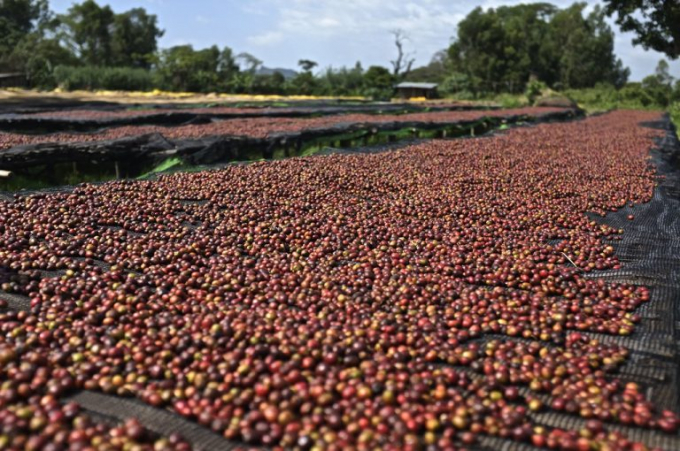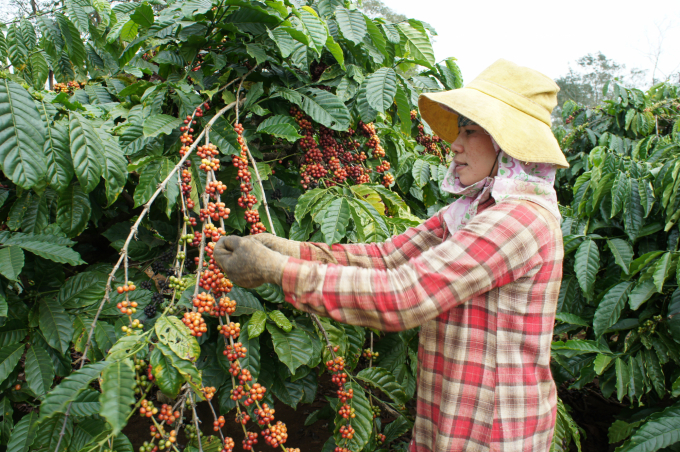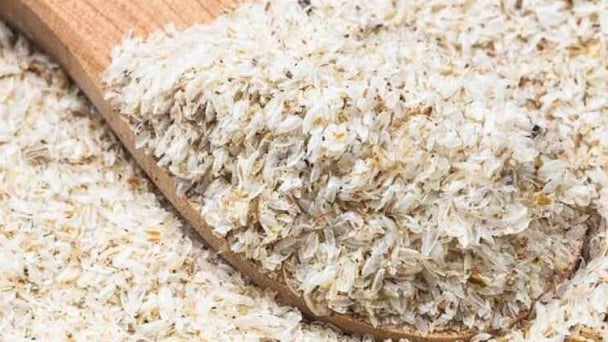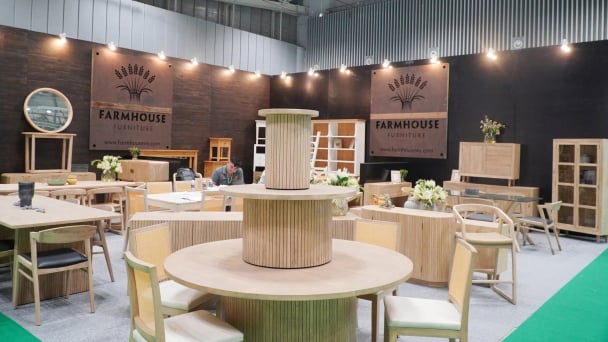May 29, 2025 | 09:13 GMT +7
May 29, 2025 | 09:13 GMT +7
Hotline: 0913.378.918
May 29, 2025 | 09:13 GMT +7
Hotline: 0913.378.918
For many years, Nestlé has been a leading enterprise in purchasing and exporting Vietnamese coffee to the EU, which is the largest market for Vietnamese coffee (accounting for about 40% of total coffee exports).

Drying the whole fruit coffee will help reduce pesticide residues. Photo: TL.
But according to some Vietnamese coffee companies, selling to Nestlé is increasingly difficult because the EU is tightening regulations on residue of plant protection drugs on imported coffee.
Particularly, MRLs (maximum residue limit) of Glyphosate on green coffee imported into the EU is 0.1 mg/kg. According to Mr. Thai Nhu Hiep, Chairman of the Board of Directors of Vinh Hiep Company Limited (Gia Lai), the MRLs of 0.1 mg/kg can be considered as zero. With such strict regulations on MRLs, Mr. Do Ha Nam, Chairman and CEO of Intimex Group, said that “Selling green coffee to Nestlé is now extremely difficult. Only green coffee bought in Gia Lai can be sold to Nestlé”.
Facing difficulties in exporting coffee to the EU because of pesticide residues, Gia Lai is considered a success in solving this problem.
According to Mr. Do Ha Nam, Gia Lai coffee is prefered by foreign businesses because coffee here is basically free of Glyphosate residues. Therefore, the price of Gia Lai coffee is often much higher than that of other Central Highlands provinces. Even the price of Gia Lai coffee sold right at Gia Lai is higher than the price of coffee sold by other provinces in Ho Chi Minh City.
Explaining this problem, Mr. Thai Nhu Hiep revealed that coffee farmers in Gia Lai have a different tradition of planting, tending, harvesting and processing from other Central Highlands provinces. For example, in the drying stage, while farmers in other provinces grind the coffee fruits and then dry them, Gia Lai farmers leave the whole coffee to dry.
Drying whole fruit, the residues of pesticides on Gia Lai coffee are usually much lower than that of coffee elsewhere. With separate production, harvesting and processing processes, Gia Lai coffee often gives better quality.
However, Gia Lai coffee has recently been stuck when exported to the EU because of toxic residues. According to Mr. Thai Nhu Hiep, due to the lack of sunlight in this harvest season, it was impossible to release pesticide residues, at the same time, carbon was absorbed, producing more toxins.

Gia Lai farmers have a much better tradition of cultivating, tending, harvesting and processing than other provinces in the Central Highlands. Photo: TL.
On the other hand, the current practices in coffee purchasing is also causing Gia Lai coffee to be cross-contaminated with pesticide residues, especially Glyphosate from coffee of other places.
Mr. Do Ha Nam, said that small traders often buy coffee from many gardens and then store in one place. After gathering a few tons or tens of tons, they sell to larger barns. These barns also receive coffee from many different traders, from many different regions, and store them all in the warehouse. Such practice is leading to cross-contamination of pesticide residues from one coffee batch to another.
Given this situation, Mr. Hiep said that the Ministry of Agriculture and Rural Development needs to carry out traceability, issue codes for coffee growing areas, so that when needed, it is possible to find out which coffee producing areas have problems of pesticide residues, thereby having solutions to promptly handle it.
“From the practice of coffee production in the Central Highlands, it shows that if we can control Glyphosate residue as in Gia Lai, the coffee price will be very good. Otherwise, coffee growers will lose a huge amount of money.
Other localities in the Central Highlands need to follow coffee farmers in Gia Lai so as to increase their income by increasing product prices.
At the same time, ensure food safety standards, thereby make their entry into difficult markets ... ".
(Mr. Do Ha Nam, Chairman and CEO of Intimex Group)
Translated by Thu Hang

(VAN) The import-export turnover between Vietnam and Singapore rose amid a trade rebound, with machinery, electrical equipment, and fuels making up the majority of the transaction value.

(VAN) Director General of the General Administration of Customs of China, Ms. Sun Mai Jun, has pledged to implement measures that will ease the import process for Vietnamese agricultural products.

(VAN) Although Vietnam is still increasing its coffee exports, the industry is currently in the process of determining market strategies in response to the U.S. imposition of reciprocal tariffs.

(VAN) With rising demand in Muslim-majority countries, Halal certification is becoming a critical passport for Vietnamese agricultural products seeking sustainable market access and consumer trust in the Middle East and Africa.

(VAN) Vietnam’s fruit and vegetable exports to the U.S. are rising sharply, and exporters are hoping that any upcoming reciprocal tariffs will be set at manageable levels.

(VAN) Despite meeting quality standards, Vietnamese rice bran exporters still face difficulties with administrative procedures under the new protocol.

(VAN) The U.S. is tightening import tariffs and origin inspections, requiring Vietnamese businesses to proactively prepare in terms of legal compliance, supply chains, and appropriate export strategies.